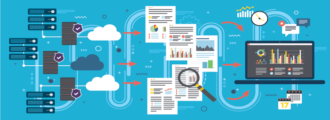Enterprise organizations face a persistent challenge: their most valuable data assets remain locked in separate systems, creating costly data exports and limiting strategic insights. While HR and Finance teams generate large amounts of critical business intelligence, this information often sits isolated from customer and market data, preventing the unified view necessary for modern decision-making.
Workday Data Cloud represents a fundamental shift in how organizations access and leverage their workforce and financial information. Rather than treating data as a byproduct of transactions, this next-generation platform transforms workday data into a strategic asset that powers AI-driven innovation and real-time business insights.
This comprehensive guide explores how Workday Data Cloud unifies previously siloed information, eliminates the need for costly data exports, and enables organizations to build more accurate predictive models using their most trusted data layer.
What is Workday Data Cloud?
Workday Data Cloud is an enterprise data platform designed to unlock the strategic value of HR and Finance data for analytics, decision-making, and AI-powered innovation. Unlike traditional data warehouses that require costly extraction processes, this platform serves as a federated, integrated layer that connects Workday’s core systems with major analytics platforms.
The platform addresses a critical enterprise need: accessing workday business objects without creating data silos or maintaining duplicate datasets. Through zero-copy data sharing, organizations can analyze their HR and Finance data alongside customer and business data from external systems, creating a comprehensive view of business performance.
Four foundational components define the Workday Data Cloud architecture:
- Workday Data Lake: Centralizes access to a curated catalog of business objects spanning Workday Human Capital Management, Payroll, Learning, Financial Management, Spend Management, Recruiting, and Student modules. This acts as the authoritative hub for all organizational data, improving consistency and removing redundancy.
- Workday Data Connect: Enables secure, zero-copy, two-way sharing between Workday and leading data platforms, including Databricks, Salesforce Data Cloud, and Snowflake via Apache Iceberg connections. This eliminates the traditional ETL bottlenecks that plague enterprise data initiatives.
- Workday Live Data Query: Provides direct SQL access to Workday objects, enabling data teams to use familiar tools and workflows to access the trusted Workday data layer. This capability enhances agility and integration possibilities across existing analytics platforms.
- Workday Prism: Extends Workday’s data consolidation capabilities, bringing together third-party and cloud data for enriched analytics without building costly, bespoke integrations.
Key Partnerships and Zero-Copy Data Access
Snowflake Integration and AI Acceleration
The partnership with Snowflake’s AI data cloud removes traditional barriers that force organizations to export and duplicate their Workday data. Through the same zero-copy approach, finance teams can combine Workday data with sales data, operational metrics, and customer and market data stored in Snowflake environments.
This integration enables organizations to connect performance data from multiple sources, creating comprehensive dashboards that sync financial data with real-time business outcomes. For example, retail organizations can correlate employee engagement metrics from Workday with store performance data in Snowflake to identify high-impact teams that drive revenue.
Databricks Partnership for Advanced Analytics
Databricks integration focuses on enabling data teams to build sophisticated machine learning models using Workday’s Financial and HR data. The platform supports AI model development by providing governed access to financial data with market benchmarks and operational data from across the enterprise.
This partnership particularly benefits organizations seeking to accelerate advanced analytics initiatives. Data scientists can now combine Workday financial data with external datasets to power real-time forecasting and scenario planning without lengthy data preparation processes.
Salesforce Data Cloud Connectivity
The Salesforce Data Cloud Connector provides seamless integration between Workday’s workforce data and Salesforce’s customer relationship management platform. This connection creates unified profiles that combine employee performance metrics with customer interaction data.
Organizations can configure data refresh intervals, including hourly, daily, weekly, or monthly, depending on their business requirements. The connector supports both incremental and full refresh modes, ensuring that combined datasets remain up to date while minimizing processing overhead.
AI-Powered Analytics and Forecasting Capabilities
Workday Data Cloud transforms static HR and financial records into dynamic intelligence that drives business strategy. By maintaining Workday’s governance standards while enabling faster business insights, the platform supports enterprise AI platform initiatives without compromising data security or compliance.
Enhanced Predictive Modeling
The platform’s unified data layer enables more accurate predictive models by combining workforce analytics with business performance indicators. Organizations can now correlate employee sentiment data with customer satisfaction scores or link training completion rates with sales quota attainment metrics.
Traditional analytics platforms require extensive data preparation to achieve these correlations. Workday Data Cloud eliminates this friction by providing inbound zero-copy queries that access live data without duplication or transformation delays.
Real-Time Forecasting Capabilities
Financial planning transforms when organizations can power real-time forecasting using integrated data streams. The platform enables finance teams to model scenarios that incorporate workforce costs, market conditions, and operational metrics simultaneously.
For instance, organizations can evaluate the financial impact of hiring decisions by modeling headcount changes against revenue projections and market data. This integrated approach provides more accurate financial planning than traditional budgeting processes that treat workforce costs in isolation.
AI Agent Development
Workday Data Cloud supports AI innovation through integration with Workday Illuminate’s AI agent framework. These intelligent systems can process queries spanning multiple data domains, such as an employee sentiment agent that combines HR survey data with performance metrics and external salary benchmarks.
The platform’s governed data foundation ensures that AI agents operate on trusted, current information while maintaining enterprise security standards. This approach accelerates AI innovation without the typical data preparation overhead that slows enterprise AI initiatives.
Business Use Cases and Integration Scenarios
Customer 360 and Employee Experience
Organizations can create comprehensive customer views by combining Workday employee data with customer interaction histories. This integration enables customer service teams to route cases to agents based on both technical skills (stored in Workday) and recent customer interaction success rates (tracked in CRM systems).
A telecommunications company might use this integration to streamline employee onboarding processes while simultaneously improving customer experience. New employees receive personalized training plans tailored to their skill profiles and current customer demand patterns.
Performance Management and Revenue Correlation
Retail organizations use Workday Data Cloud to enrich Workday Financial Data with store-level performance metrics. This integration reveals correlations between employee engagement scores, training completion rates, and sales performance that weren’t visible when data remained siloed.
The platform enables real-time employee insight by connecting Workday data with point-of-sale systems, inventory management platforms, and customer feedback tools. Store managers can access dashboards that show how staffing decisions impact both employee satisfaction and customer outcomes.
Financial Close Process Automation
The financial close process benefits significantly from integrated data access. Finance teams can sync financial data from Workday with operational systems to automate variance analysis and accelerate month-end reporting.
Instead of manually gathering data from multiple systems, organizations can configure automated workflows that combine Workday Financial data with operational metrics, creating comprehensive financial reports that include workforce cost analysis alongside traditional financial metrics.
Data Types and Access Methods
Workday Data Cloud provides comprehensive access to the Workday platform’s underlying object model through multiple integration methods. Organizations can access over 50+ Workday web services, enabling detailed workforce insights that extend far beyond traditional HR reporting.
The platform supports various data types, including:
- Employee and workforce data from Workday Human Capital Management
- Financial transactions from Workday Financial Management
- Procurement information from Workday Spend Management
- Learning and development records from Workday Learning
- Recruitment and talent data from Workday Recruiting
Access methods include both batch processing at scheduled intervals and near real-time streaming for time-sensitive analytics. Organizations can configure refresh modes based on their specific business requirements, balancing data freshness with system performance.
Developer Platform and Customization
The Workday Data Cloud extends beyond pre-built integrations to support custom application development through the Workday Build platform. This low-code environment enables organizations to create AI-powered solutions that leverage their unified data layer without extensive technical expertise.
Workday Build Platform
Workday Build enables organizations to create custom applications that combine Workday data with external business intelligence. Developers can build solutions that support AI model development while maintaining enterprise security and governance standards.
The platform supports common integration patterns, such as data synchronization between Workday and external operational systems. For example, organizations can build applications that automatically update project management data based on employee availability and skill assessments stored in Workday.
Flowise Agent Builder
The Flowise Agent Builder provides low-code tools for creating AI chatbots and automated workflows that access the new data layer. These tools enable non-technical users to build intelligent systems that combine HR and Finance data with external business context.
Organizations can create agents that answer complex queries spanning multiple data domains. An HR chatbot might combine employee records with external salary benchmark data to provide compensation guidance, or a finance agent might correlate spending patterns with workforce productivity metrics.
API Integration and Connectivity
The platform supports API connections that enable MCP and Agent2Agent protocols, facilitating integration with existing enterprise architecture. Organizations can extend app functionality by building on the trusted people and financial data foundation without disrupting existing workflows.
These capabilities enable organizations to center their AI strategies on Workday data without requiring platform migration or significant infrastructure changes.
Enterprise Benefits and Strategic Advantages
Elimination of Data Silos
The platform’s zero-copy access approach fundamentally changes how organizations think about enterprise data architecture. Instead of maintaining expensive ETL processes that create data lag and governance challenges, organizations can access current, governed data across all business functions.
This architectural shift reduces administrative burden while enhancing both employee and customer value. IT teams spend less time managing data pipelines and more time building analytics solutions that drive business outcomes.
Competitive Intelligence and Market Position
Organizations that combine Workday data with customer and market data gain unprecedented insights into the relationships between workforce decisions and business performance. This intelligence enables more strategic workforce planning and investment decisions.
The platform supports over 11,000 organizations, including 65% of Fortune 500 companies, creating network effects as more organizations adopt integrated analytics approaches. Early adopters gain a competitive advantage by optimizing workforce strategies through comprehensive data analysis.
AI Strategy Acceleration
Workday Data Cloud enables organizations to accelerate AI innovation without the typical data preparation overhead that slows enterprise AI initiatives. The platform’s governed data foundation ensures that AI models operate on trusted, current information while maintaining enterprise security standards.
Organizations can support AI model development using their most valuable assets without disrupting existing business processes. This approach creates sustainable competitive advantages as AI becomes increasingly central to business strategy.
Operational Excellence and Decision Quality
The platform’s real-time data access capabilities transform operational decision-making across HR, finance, and business functions. Leaders can access comprehensive dashboards that combine workforce metrics with customer satisfaction, financial performance, and operational efficiency indicators.
This integrated view enables more informed scenario planning and strategic decision-making. Organizations can model the business impact of workforce decisions, evaluate market opportunities with full cost awareness, and optimize operations based on comprehensive performance data.
How Can Our Consultants Help?
Surety Systems offers comprehensive consulting services across all Workday enterprise product areas, from initial strategic planning and complex system implementation to targeted optimization of your existing configurations.
Our senior-level Workday consultants drive maximum value by ensuring seamless integration with external applications, establishing robust data governance, and empowering your organization to move beyond fragmented processes toward fully informed, cross-functional decisions that accelerate business strategy and maximize your total Workday investment.
Contact Us
For more information about our Workday consulting services or to get started on a project with our team, contact us today.



